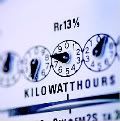Save On Your Power Bill

I just got this month's power bill. June 16th to July 16th. It was $220! Granted most days it has been 90 to 100F, but still! I only budget for $150. It looks like I am going to have to increase my budget which I really can't afford to do. I went looking for ways to save on my power bill. Here's some ideas:
1. Turn up the A/C. It's the biggest money hog in the house. In many climates, running your air conditioner at 78 instead of 72 will save 40% of your cooling bill.
2. Look into putting a timer on your hot water heater.
3. Fluff your clothes for 10 minutes then hang to dry. You can also fluff them after line drying to get out any pollen they might of absorbed.
4. Use CFL bulbs.
5. Anything that is plugged into a socket is using electricity. Unplug everything when not in use!
6. If you live somewhere where there is more than 1 electricity provider, shop around. You might be paying more then necessary.
7. If you wash on hot or warm water, consider switching to cold water.
8. Only dry at night. It really heats up your house and makes your a/c work overtime.
9. Use ceiling fans but not in rooms you aren't occupying.
10. Cell phone chargers use the same amount of energy rather there is a phone plugged into them or not! Make sure to unplug!
11. Turn down your water heater temp. It doesn't need to be more than like 115 degrees F.
12. Put a lamp on a timer in the main room of your house so it only clicks on and off when you need it the most.
13. Use natural sunlight for light except when it's hot outside. When it's hot, cover all the windows as much as possible.
14. When boiling water, use cold tap water and place the lid on the pot until it starts to boil. This will make it boil faster.
15. Turn your lights off whenever you leave a room! It really is cheaper. Check out this episode of Mythbusters!
16. Make sure your filters are clean. Check with the manufacturer of your equipment or with your utility company to see how often filters on your units need to be cleaned.
17. Set your computers to energy saving mode.
18. Don’t put furniture and other things in front of heating and air conditioning vents.
19. If you will be out of town for more than a couple days, turn off your water heater.
20. Close doors and vents in rooms you are not using.
21. Make sure that outdoor lighting is turned off during the day. Use motion-detectors lights or timer switches.
22. Turn off the water when you are brushing your teeth and take shorter showers. This will not only save water, but it will also save the electricity that it takes to pump and heat the water.
23. Decide what you want from the refrigerator or freezer before you open them so you don’t waste electricity by standing there looking inside and keeping the door open
24. Vacuum the coils of your refrigerator every few months in order to lower your energy bill and to keep the condenser working better.
25. Before putting hot foods into the refrigerator, cool them to room temperature (unless the recipe tells you not to do this)
26. Cook several food dishes in the oven at the same time
27. Keep the oven door closed until the food is done cooking
28. Defrost food before you bake or microwave it. This uses 1/3 less energy than if you baked food that was still frozen.
29. Clean the lint filter of your dryer after every load.
30. Be sure to stop the dryer as soon as the clothes are dry. Don't just use the timer setting.
31. If you can, shade your air conditioning unit. If your unit is in the bright sun, it will use up to 5% more energy than if it was in the shade.
32. Perform activities such as mopping and washing dishes in the coolest part of the day. These tasks add moisture — and heat — to your home in the summer.
33. With the bathroom door closed, a bathroom exhaust fan or open window will act to remove heat and moisture. This spares the air conditioner extra work.
34. Use your kitchen exhaust fan to remove excess heat, moisture and cooking odors. But don't let it run more than 15 minutes after cooking or it will be taking out conditioned air.
35. Use ventilated awnings and other shading devices to prevent heat from entering windows exposed to direct sunlight.
36. Each time the door is opened, hot air enters your home. Try to keep in-and-out traffic from overworking your cooling system.
37. Remember that dark colors absorb heat. You can repel excess heat by using light-colored blinds, shades and draperies on the sunny sides of the house. Make sure the draperies are insulated or lined.
One of the most efficient ways to lower water heating costs is to use less hot water. Here are some energy-saving tips to curtail your hot water consumption:
- Close the sink drain when shaving and you will save gallons of hot water.
- When you hand wash dishes, stopper the sink or use a dishpan. Constantly running wash or rinse water amounts to about 30 gallons of water per meal. Be sure to prerinse dishes with cold water.
- Equip your shower with a flow control or regulator and you can reduce the volume of water by two to four gallons per minute, while increasing pressure to 30 pounds per square inch. Look for these devices at your local hardware store.
- Repair dripping faucets and save water, energy and money. Dripping faucets overwork the water heater, erode valve seats and often cause ugly sink stains. Repair leaking faucets by replacing washers.
- Turn down the thermostat on your water heater to 140°, 120° if you don't use a dishwasher.
Making sure your refrigeration appliance operates efficiently
- Locate your refrigerator or freezer away from heating equipment, heater vents and direct sunlight. Provide adequate clearance above, behind and on the sides for good air circulation.
- Be sure your unit is level so that the door seals properly.
- For best operation, keep your refrigerator's temperature between 37° and 40° and your freezer's setting at 0°. These settings are recommended by the Food and Drug Administration and will prevent rapid bacterial growth.
- Keep condenser coils clean and unobstructed for maximum energy savings.
- A tight-sealing door gasket is critical to the efficiency of your refrigerator. Clean gaskets with warm water or a detergent that leaves no residue.
- Don't overload your refrigerator or freezer with food, as this overloads the compressor. Place foods slightly apart on shelves, making sure they do not block the unit's interior air vents.
- Cover all liquids stored in the refrigerator. Moisture can be drawn into the air, making the unit work harder.
- Unless a recipe requires hot foods to be rapidly chilled or frozen, save energy by letting them cool outside the refrigerator or freezer. To avoid bacterial growth, food should not be set out more than 20 minutes after cooking is completed.
- Opening and closing refrigerator and freezer doors often — or holding the door open too long - - causes the unit to use more energy than necessary. Decide what you want before opening the door, and remove several items at once.
Cook up some energy savings
Oven cooking is more economical than surface cooking. When you have both a large and a small oven, use the small one whenever possible. Use these tips for efficient oven cooking:
- Save time and energy by using one oven to prepare the entire meal. A pie or cake can go into the oven as a main dish is removed.
- Warming foods, plates and platters with the oven's stored heat after baking, requires no energy. If the food must be kept warm for an extended period of time, set the oven no higher than 140° to 200°. A food warmer built into a range usually requires less energy than an oven or surface unit when keeping food heated.
- Consider using a microwave oven, small portable electric frying pan, grill, or toaster/broiler instead of the oven. These small appliances use about 1/3 the power of an oven broiler.
- Cook by time and temperature. Precise timing eliminates repeated opening of the oven door to check on cooking progress. Each time the door is opened, the temperature drops 25° to 50°.
Cooking on the range uses energy continuously so its important to follow these energy-saving tips:
- Choose pots and pans that evenly cover the heating elements. Use pans with flat bottoms, straight sides and tight-fitting lids that hold heat and permit lower settings.
- Use a slow-cooker or crockpot to cook stews and other single-dish meals. You'll save energy, time and effort.
- When cooking fresh or frozen vegetables, use only enough water to produce steam and prevent sticking. Reduce to simmer and cover tightly so vegetables retain vitamins and minerals — and taste better, too.




Have you signed up with budget billing? It's great. They look at your monthly usage for the last 12 months and get the average usage. And that's what you pay for every month. Right now ours is $169/month. Some months we may only use $145 worth of power but then other months we may use $180 or more. If several months go by and you are using alot more (or alot less) than your average it will adjust your average and your payment. But it's never more than $5 or $6 at a time and they give you a month's notice if it's going to go up or down. I got on the budget billing a couple years ago after we had a $98 April bill and a $220 June bill! (I've also cut down our power usage considerably but the budget billing helps lessen the spikes too)
Post a Comment